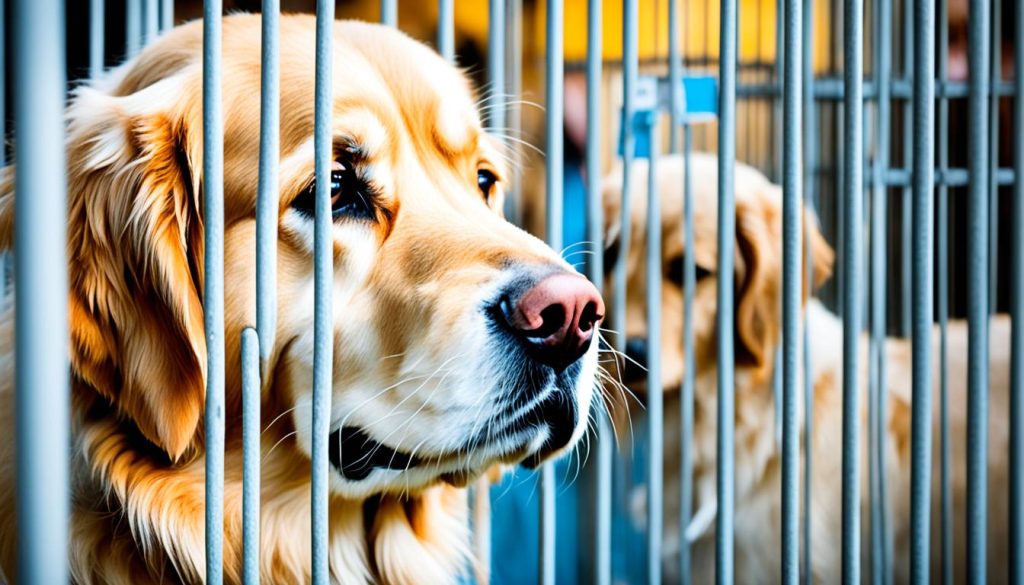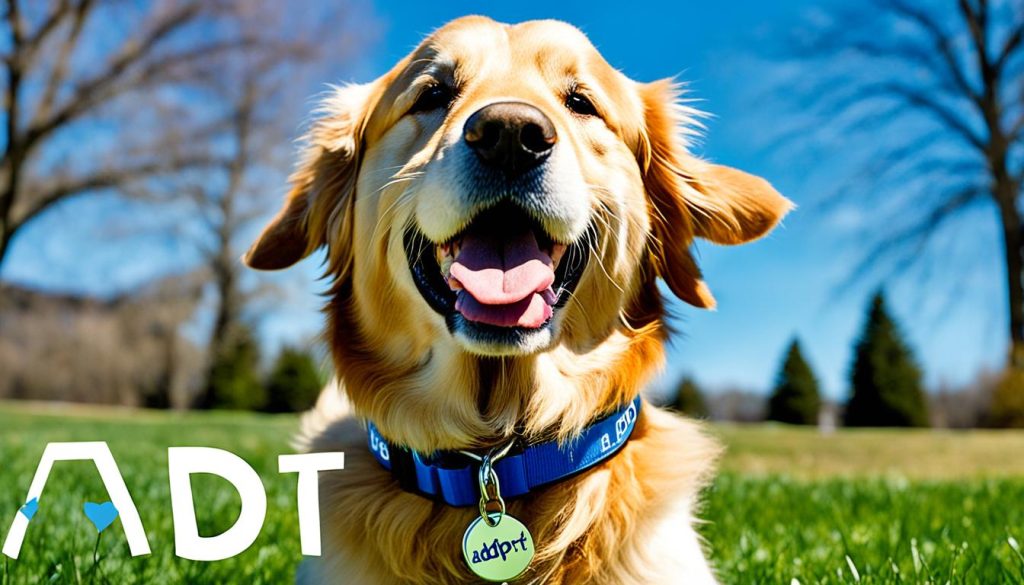Each Golden Retriever possesses a distinctive narrative, characterised by tales of wagging tails and expressive eyes questing for a perennial abode. Their journey towards a new beginning often navigates through pet rescue centres, bastions of compassion and nurture. For individuals contemplating an augmentation of their familial unit, choosing to adopt a Golden Retriever bestows upon these amiable canines the affectionate setting they inherently merit. The act of dog adoption transcends a mere benevolent gesture; it inaugurates a transformative odyssey for all involved parties. Such a commitment, as adoption rates surge, morphs the previously uncertain destinies of myriad rescue dogs into narratives replete with optimism and shared experiences.
Key Takeaways
- Adopting a Golden Retriever can profoundly impact both the dog’s and owner’s lives.
- Pet rescue organisations provide a lifeline for dogs in need.
- Dog adoption is a responsible and rewarding way to find a new companion.
- Pet adoption from shelters offers Golden Retrievers a much-needed second chance.
- Supporting rescue efforts plays a vital role in promoting dog welfare practices.
The Plight of Golden Retrievers and the Need for Rescue
In the UK, the increasing need for rehoming dogs burdens rescue organisations heavily. Economic difficulties, unintended litters due to overbreeding, and a lack of breed awareness exacerbate this situation. Together, these factors lead to a surge in Golden Retrievers in need of new homes.

Understanding the Surge in Rescue Needs
Animal welfare experts have observed a notable influx of Golden Retrievers into rescue facilities. The appeal of owning a pedigree dog often obscures the intense care, time, and resources required. The desire for a third pet is rising, but the associated responsibilities and costs are frequently underestimated, driving the need for rehoming services.
The Role of Rescue Organisations in Dog Welfare
Rescue organisations are crucial for the well-being of these dogs. They not only provide shelter but also rehabilitate and ready the dogs for adoption. The process includes health assessments, behavioural evaluations, and support from committed volunteers. The shared goal of these shelters is to improve dog welfare and educate future owners on the commitment rescue dogs entail.
Common Misconceptions about Rescue Dogs
The myths around rescue dogs hinder their adoption. Many believe rescue dogs are too troubled to adapt to new homes, yet success stories prove otherwise. These narratives challenge misconceptions, showcasing Golden Retrievers’ loving and adaptable nature. They underscore the message that every dog deserves a chance at a loving home.
| Cause of Surrender | Impact on Shelters | Adoption Outcomes |
|---|---|---|
| Financial Hardship | Influx of Animals | Multiple Adoptions |
| Lack of Breed Knowledge | Extended Care Periods | Educated Adopters |
| Overbreeding | Strain on Resources | Rescue Animal Integration |
Golden Retriever Rescue: How to Get Involved
Considering the adoption of a dog, particularly from a breed-specific rescue? Golden Retrievers stand out as one of the most friendly breeds. They seamlessly integrate into familial environments. Individuals with compassion can engage with rescue organisations in a variety of ways, irrespective of their ability to offer a permanent residence.
The dog adoption journey begins with an application in most rescue organisations. They aim to grasp the potential adopter’s lifestyle, experience, and living conditions. A home inspection follows, ensuring the environment’s safety and appropriateness, culminating in pairing each Golden Retriever with their ideal home. This thorough procedure ensures every dog is enveloped in love, care, and stability within their new family.
| Support Type | How to Get Involved | Impact on Rescues |
|---|---|---|
| Adopting | Fill out an application, participate in home checks, and find the perfect match for a lifelong companion. | Directly saves a life and creates space for another in need. |
| Volunteering | Donate time in various capacities at shelters or through fundraising events. | Increases the rescue’s capacity to care and rehabilitate. |
| Donating | Provide funds or supplies as requested by rescue groups. | Enables ongoing operation, veterinary care, and feeding. |
| Fostering | Open your home temporarily to a Golden Retriever awaiting adoption. | Provides a nurturing environment critical for health and socialisation. |
Adopting a dog from rescue organisations is commendable, but other vital avenues also exist to support Golden Retriever rescues. Volunteering or donating can significantly relieve operational and financial stresses on these non-profit entities. Fostering serves as an essential bridge for dogs, preparing them for their eventual permanent homes while aiding their health and emotional state.
“By getting involved with Golden Retriever rescues, you’re not just giving dogs a second chance. You are also advocating for a mutually respectful relationship between humans and animals,” shared a spokesperson from a renowned rescue organisation.
Choosing to adopt a dog, volunteer, donate, or foster, each significantly impacts the welfare of Golden Retrievers and those committed to their care. Each supportive act is pivotal, ensuring these dogs experience a life filled with love and security.
Conclusion
In the examination of Golden Retriever rescue, we have ventured deep into the poignant voyage of these dignified animals and highlighted the paramount significance of dog welfare. Rescue organizations serve as a luminary of hope, incessantly working to transform the fates of numerous Golden Retrievers. This narrative underscores the essence of selflessness and compassion, demonstrating how rescue initiatives profoundly enrich the lives of the dogs and their adoptive families alike.
Engaging in pet adoption emerges as a compelling critique of the commercialisation of animal existence, fostering a nurturing ethos of care and respect. Opting for adoption over purchase, individuals engage in a pivotal societal evolution towards a more empathetic interaction with animals. Each tale of adoption, each precious interaction between a Golden Retriever and their new family, reinforces the relentless dedication of rescues and volunteers to this honourable endeavour.
The united efforts of the rescue community invite our audience to contribute actively to this crusade. Whether by adopting a pet, volunteering time, or donating resources, every individual’s contribution echoes through animal shelters and forwards into the lives of these splendid beings. May the story of Golden Retriever rescue be a testament to perpetual commitment, where each act of support builds upon a heritage of benevolence and dedication to animal welfare.
FAQ
What is Golden Retriever rescue and why is it important?
Golden Retriever rescue focuses on rehabilitating and rehoming abandoned or surrendered canines. It plays a critical role in safeguarding these animals’ welfare, offering them a renewed opportunity for a fulfilling life. By choosing adoption, individuals support the cause of animal well-being. This action also counteracts the overcrowding of shelters by promoting responsible pet keeping.
Why are there so many Golden Retrievers in need of rescue?
The surge in Golden Retrievers requiring rescue stems from multifaceted issues. Owners often face economic difficulties or misjudge the breed’s demands, while unregulated breeding exacerbates the situation. Consequently, many dogs are left with shelters or rescue groups, escalating the need for their rehoming services.
How do rescue organisations support dog welfare?
Rescue entities are fundamental in championing canine welfare. They offer refuge, recovery programs, and address medical necessities, thus enhancing dogs’ quality of life. Besides providing direct assistance, these organisations enlighten the public on responsible pet ownership. Their unwavering dedication ensures the prosperity of Golden Retrievers in their care.
Are rescued Golden Retrievers less capable of bonding with new owners?
It’s a misapprehension that rescued Golden Retrievers struggle to connect with new families. These dogs often exhibit remarkable resilience and adaptability. In their adoptive environments, they flourish, demonstrating profound affection and faithfulness towards their caregivers.
How can I get involved with Golden Retriever rescue?
Engagement in Golden Retriever rescue can take various forms. Potential activities include adopting one of these dogs, volunteering at rescue centres, providing temporary foster care, or contributing financially. The adoption mechanism involves a thorough assessment to ensure a harmonious pairing between the canine and the prospective adopter. Support beyond adoption is vital for the sustenance of these shelters.
What are the benefits of adopting a dog from a Golden Retriever rescue?
Adopting a Golden Retriever from a rescue organisation yields multiple advantages. It not only secures a second chance for a deserving dog but also mitigates the burden on animal shelters. This process aids the continued operations of rescue groups. For the adopter, the companionship of a pet introduces unparalleled joy and camaraderie into their domicile.
Can I adopt a Golden Retriever if I’ve never owned a dog before?
Novice dog owners are often eligible for adoption. Rescue organisations furnish necessary guidance and endorse preparedness among new custodians. This facilitation ensures a suitable match, considering the experience, lifestyle, and reciprocal needs of both the human and the dog.
What should I consider before adopting a Golden Retriever from a rescue?
Prior to adopting, evaluate your capability to meet the demands of dog ownership. Reflect on factors such as the required time, space, financial commitment, and the breed’s particular needs. A deep understanding of the Golden Retriever’s characteristics confirms whether it aligns with your way of life.
Do rescue organisations provide medical care for their dogs?
Affirmatively, rescue groups ensure comprehensive medical attention for canines pre-adoption. This regimen encompasses immunisations, sterilisation procedures, and treatment of any prevailing health anomalies.

